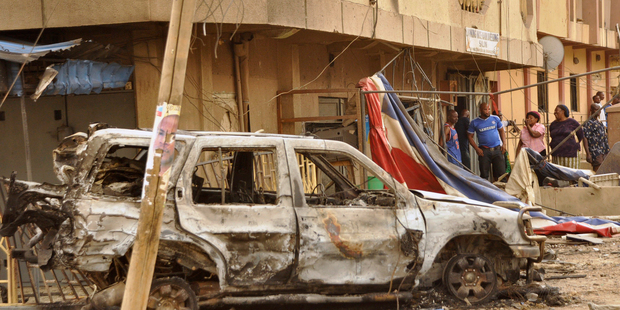Boko Haram
Members of deadly Boko Haram marked the beginning of December with bloody attacks on two northeastern towns of Damaturu, and Maiduguri, capitals of Yobe and Borno States respectively.
The insurgents attacked early morning in Damaturu, but used two female bombers to devastate the Maiduguri market midday on Monday. A similar bombing by two women last Tuesday killed at least 45 people.
The swift reaction of the military to the development limited the atrocities committed by the dreaded sect.
Fighter jets of the Nigerian Air Force were deployed alongside troops from both Yobe and Borno State to chase the insurgents out of the town.
The Civilian Joint Task Force also joined the military in the operation to rid the town of the insurgents.
By the time the dust from the attack settled, over 80 persons had been killed.
The Commissioner of Police in Yobe State, Marcus Danladi, told newsmen that the Command was dealing with a “serious situation”.
Over 40 Boko Haram members were reportedly killed.
From Maiduguri comes the report that no fewer than 20 persons were killed when suicide bombers attacked the popular Monday Market in the town.
The bombing in Maiduguri was carried out by two women wearing traditional Muslim clothing. Witnesses said one woman in a hijab carrying a bundle was stopped and questioned by civilian vigilantes as she approached a busy area where chicken vendors have their stalls. The vigilantes insisted on checking her bundle, and as she protested and shoppers gathered to see what was going on, she detonated two bombs.
A second woman who was entering a shop at the market at that time detonated another explosive, witnesses said.
“There were two women, both of them dressed in Muslim hijab,” said Yaqub Isa, a trader at the market who saw what happened and narrowly escaped being wounded by the explosions.
“While the first one was being interrogated,” Mr. Isa said, “the second one sneaked into a nearby shop.”
The police at first said that only a half-dozen people had been killed, but witnesses reported seeing many more bodies. The Nigerian authorities routinely understate casualties in their reports. A worker at Maiduguri Specialist Hospital said 25 wounded people and 16 corpses had been brought there.
It was at this point that the explosive went off.
Shortly after this, an explosive planted in a vehicle was said to have been detonated, increasing the number of casualties.
Over 50 persons were injured.
According to a New York Times report, Witnesses said that despite that earlier attack, no troops were guarding the market on Monday. The Nigerian Army has repeatedly been criticized for its reticence in confronting the Islamist militants, and when military personnel arrived at the scene after the explosions on Monday, they were shouted down by angry youths and told to leave, witnesses said.
The Damaturu attack was a raid by Boko Haram on military, police and government facilities that began before dawn. Residents cowered indoors all morning while gunfire rang out, witnesses said.
The militants were eventually driven out, with the aid of a Nigerian military jet, but not before they burned what remained of a police facility that was attacked and damaged a year ago. The attackers also tried to reach Government House, the seat of the Yobe State government in Damaturu.
The Boko Haram fighters, who obtain most of their weapons by seizing them from the Nigerian military, appeared to be trying to get military equipment stockpiled in the city. Officials and witnesses said the raid had failed, though the gunfire went on for hours. “The security effort is still ongoing,” a spokesman for the Yobe State governor said in a statement Monday afternoon.
The two attacks on Monday appeared to be part of the grim drumbeat of violence mounted almost daily by Boko Haram. By contrast, the attack on Friday in the Kano mosque was exceptional, both for its high death toll and for its symbolic portent.
The mosque is next to the palace of the emir of Kano, one of the highest-ranking figures in Nigerian Islam. Kano is one of Africa’s largest predominantly Muslim cities, and it is outside the usual zone of Boko Haram attacks.
The emir — Lamido Sanusi, a former governor of the country’s central bank — has been outspoken in his criticism of the federal government in Abuja, the capital. He recently urged citizens to defend themselves against Boko Haram, in the absence of an effective military.
The Nigerian government’s security strategy has shifted frequently and remains uncertain. On Monday, the American Embassy in Abuja said Nigeria had canceled an agreement providing for continued American training of a Nigerian battalion, expressing regret for the “premature termination.”
American assistance to Nigeria has been sharply limited by American legal prohibitions against close dealings with foreign militaries that have engaged in human-rights abuses. Washington has refused to provide weapons and equipment that the Nigerian military wants.
Those limits have in turn been sharply criticized by Nigerian officials, including the country’s ambassador to the United States.
Nigeria was once a principal source of American crude oil imports, but with the United States’ boom in domestic production, Nigeria’s strategic importance has faded somewhat, analysts said.
According to accounts, the terrorists numbering over 100 entered into Damaturu as early as 5am, shooting sporadically, bombing targets and razing down houses.
The swift reaction of the military to the development limited the atrocities committed by the dreaded sect.
Fighter jets of the Nigerian Air Force were deployed alongside troops from both Yobe and Borno State to chase the insurgents out of the town.
The Civilian Joint Task Force also joined the military in the operation to rid the town of the insurgents.
By the time the dust from the attack settled, over 80 persons had been killed.
The Commissioner of Police in Yobe State, Marcus Danladi, told newsmen that the Command was dealing with a “serious situation”.
Over 40 Boko Haram members were reportedly killed.
From Maiduguri comes the report that no fewer than 20 persons were killed when suicide bombers attacked the popular Monday Market in the town.
The first to hit the market was a female suicide bomber.
Market men and women who suspected the movement of a woman were said to have approached her to find out the content of a bag with her.
It was at this point that the explosive went off.
Shortly after this, an explosive planted in a vehicle was said to have been detonated, increasing the number of casualties.
Over 50 persons were injured.
Just last week, two female suicide bombers also hit the market, leaving over 60 persons dead.












